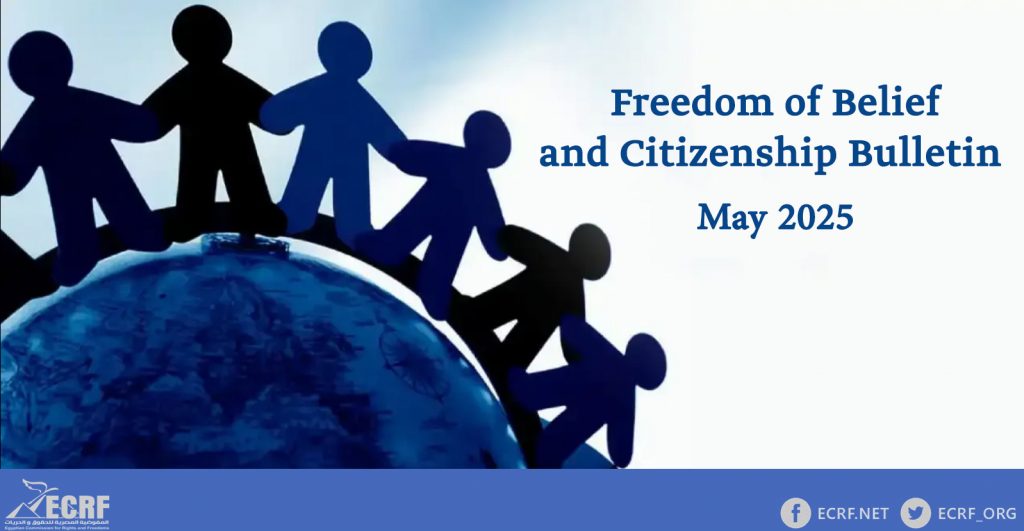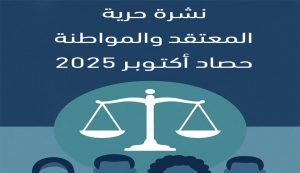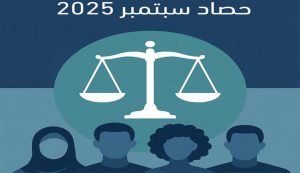The Egyptian Commission for Rights and Freedoms launches its special bulletin on “Freedom of Belief and Citizenship” to address the concerns and issues faced by minorities, to promote a culture of tolerance, to reject violence and hate speech, and to uphold the values of citizenship. In this issue, the Commission sheds light on the most significant developments and violations related to freedom of belief and citizenship during May 2025.
Article 3 of the 2014 Constitution stipulates that “The principles of the laws of Egyptian Christians and Jews are the main source of legislation governing their personal status, religious affairs, and selection of their spiritual leaders.”
This article indicates the freedom of followers of different Abrahamic religions to adhere to the principles of their faiths, to choose their religious leaders, and to manage all matters related to their religious beliefs — reaffirming the independence of the Church and Egyptian Christians in managing their religious affairs.
It is also important to recall that the preamble of the 2014 Constitution refers to the Egyptian people’s welcoming of the Virgin Mary and her son, and their protection of them during their sacred journey through Egypt. This reflects the Egyptian people’s respect and appreciation for Christianity. Moreover, the advent of Islam in Egypt worked to protect Egyptian Christians from the Romans who were occupying the country at the time, with Egyptians offering thousands of martyrs in defense of the Church of Jesus Christ.
On Sunday, December 30, 2018, President Abdel Fattah El-Sisi issued Presidential Decree No. 602 of 2018, forming the Higher Committee for Combating Sectarian Incidents, chaired by the Presidential Advisor for Security and Counterterrorism Affairs, and including representatives from: the Armed Forces Operations Authority, Military Intelligence, General Intelligence, Administrative Control Authority, and National Security.
The decree was published in the Official Gazette. According to the decree, the committee may invite ministers or their representatives, as well as representatives of concerned entities, to attend its meetings when considering related matters.
The Higher Committee for Combating Sectarian Incidents is tasked with developing a general strategy to prevent and address sectarian incidents, monitoring its implementation, and establishing mechanisms for handling such incidents if they occur.
The committee prepares a periodic report on its work, recommendations, and implementation mechanisms, which is submitted by its chairperson to the President of the Republic.
Key Developments and Violations in the File of “Freedom of Belief and Citizenship” During May 2025:
News on Freedom of Belief and Citizenship:
- On May 5, 2025, His Holiness Pope Tawadros II, Pope of Alexandria and Patriarch of the See of St. Mark, affirmed that Copts enjoy full citizenship just like Muslims. He noted that the situation has improved significantly following the June 30 Revolution, pointing out that the Egyptian state, under the leadership of President Abdel Fattah El-Sisi, built the largest cathedral in the Middle East. For the first time in history, the president attended the Christmas Mass.
Pope Tawadros II expressed, in media statements to the Serbian national broadcaster RTS, the national news agency TANJUG, and the religious channel HRAM — during his pastoral visit to Serbia as part of his tour in the Diocese of Central Europe — his gratitude to God for the blessing of living in Egypt among Muslim brothers with religious freedom. - On May 5, 2025, President Abdel Fattah El-Sisi received Dr. Mufaddal Saifuddin, the Sultan of the Bohra community in India, along with his sons, Princes Jaafar Al-Sadiq Imaduddin, Taha Najmuddin, and Hussain Burhanuddin, in the presence of Mr. Mufaddal Mohammed, the Sultan’s representative in Cairo.
The official spokesperson for the Presidency stated that the President began the meeting by welcoming Sultan Mufaddal Saifuddin as a dear guest of Egypt, praising the deep historical ties between Egypt and the Bohra community. The President commended the community’s valued efforts in restoring and renovating the shrines of Ahl al-Bayt and several historic mosques in Egypt — efforts aligned with the state’s initiatives to develop Historic Cairo. He also praised the community’s developmental and charitable projects in Egypt, in partnership with the “Tahya Misr” Fund.
Ambassador Mohamed El-Shennawy, the spokesperson, added that Sultan Mufaddal expressed deep appreciation for the warm reception he always receives during his visits to Egypt and his particular esteem for the President, who consistently welcomes him. He praised Egypt’s ongoing developmental efforts and comprehensive renaissance in all sectors, alongside the entrenchment of the principles of citizenship and tolerance. - On May 6, 2025, Dr. Mohamed Al-Duwaini, Deputy of Al-Azhar Al-Sharif, received a delegation from the Vienna Group for Religion and Diplomacy, led by Mr. Alexander Rieger, the group’s coordinator and founder. The group includes official representatives from 14 European countries and seeks to promote interfaith dialogue and the culture of coexistence and freedom of belief.
The Deputy of Al-Azhar welcomed the delegation, praising their noble humanitarian efforts, and stressed that Al-Azhar is always open to cooperation with advocates of dialogue, based on the global mission of His Eminence Dr. Ahmed Al-Tayeb, the Grand Imam of Al-Azhar. This mission is embodied in major initiatives, foremost among them the Document on Human Fraternity, signed by the Grand Imam and the Pope of the Vatican, which was adopted by the United Nations as an International Day of Human Fraternity.
He added that the Document on Human Fraternity, signed by the Grand Imam and Pope Francis in Abu Dhabi on February 4, 2019, is the most significant humanitarian document of the modern era. It has succeeded in establishing new standards for coexistence among peoples and calling for justice for the poor and marginalized, while combating hate speech. He emphasized that dialogue has never been a passing phase in Al-Azhar’s history, but rather a continuous path reflected in major conferences such as the “East and West” Conference in Bahrain, attended by the Grand Imam and the Pope. The conference affirmed to the world that religions are innocent of violence and hatred, and that human dignity and the right to live in peace and tolerance are fundamental. - On May 7, 2025, Dr. Rev. Andrea Zaki, President of the Evangelical Community of Egypt and Head of the Coptic Evangelical Organization for Social Services, praised President Abdel Fattah El-Sisi’s remarks on religious freedoms, made during a joint press conference with Greek Prime Minister Kyriakos Mitsotakis.
Rev. Zaki affirmed that “the President’s statements reflect a genuine national direction that places freedom of belief and equality among citizens at the forefront of the Egyptian state’s priorities.” He added, “We highly value President El-Sisi’s remarks, which expressed the state’s true commitment to building houses of worship for both Muslims and Christians in new urban communities, in addition to the reconstruction of 65 churches damaged during difficult periods. These statements are not merely a political stance but reflect a deep national vision that upholds the value of pluralism and establishes freedom of belief as a cornerstone of building a modern state.” - On May 8, 2025, His Eminence Dr. Nazir Mohamed Ayad — Grand Mufti of the Republic and Secretary-General of the General Secretariat for Fatwa Authorities Worldwide — congratulated Mr. Miguel Ángel Moratinos on his appointment as the UN Special Envoy on Combating Islamophobia.
The Mufti affirmed that this important decision is a positive step reflecting the international community’s commitment and ongoing efforts to confront the growing phenomenon of Islamophobia and to promote the values of dialogue and peaceful coexistence among peoples and civilizations.
He also expressed his full confidence that Mr. Moratinos, with his extensive experience in civilizational dialogue and his distinguished leadership of the Alliance of Civilizations, is well-equipped to achieve concrete success in his new mission — a task that comes at a time when the world is in urgent need of reinforcing values of tolerance, mutual respect, and the rejection of all forms of hatred and extremism. - On May 12, 2025, Dr. Christine Zaher Hanna, Professor in the Department of Curriculum and Instruction at the Faculty of Education – Port Said University, denied social media rumors regarding her teaching of Islamic religion at the faculty. She confirmed that these claims are entirely false.
In a Facebook post, Zahir explained that she holds a Bachelor’s degree in Arts and Education in Arabic Language and Islamic Studies (2001), and earned a PhD in Education from Ain Shams University in 2010. She currently teaches Arabic language teaching methods, not religious subjects. She also denied rumors about her association with Al-Azhar University, stating that she never studied there. Her appointment at the Faculty of Education at Suez Canal University in 2002 was based on a recommendation from the Grand Sheikh of Al-Azhar at the time, after proving her eligibility for the position. - On May 12, 2025, the Patriarchs of the three Oriental Orthodox Churches signed the Document of Brotherhood and Love during a joint Divine Liturgy at St. Mark’s Cathedral in Abbassia, Cairo, commemorating the 17th centenary of the First Ecumenical Council of Nicaea, held in 325 AD.
The liturgy and document signing were attended by His Holiness Pope Tawadros II, Pope of Alexandria and Patriarch of the See of St. Mark; Patriarch Mor Ignatius Aphrem II, Patriarch of Antioch and All the East of the Syriac Orthodox Church and Supreme Head of the Universal Syriac Orthodox Church; and Catholicos Aram I, Catholicos of the Armenian Orthodox Church of the Great House of Cilicia — along with a number of metropolitans and bishops from the three churches.
For the first time, the Gospel of the liturgy was read in three languages — Arabic, Syriac, and Armenian — by the three patriarchs, each of whom delivered a homily to mark the 17th centenary of the Council of Nicaea.
A meeting was also held recently between the patriarchs at the Logos Center in Wadi El-Natroun, during which several topics of mutual interest were discussed, including the celebration of the 1700th Jubilee of the Council of Nicaea, relations with ecumenical councils in which the three churches hold membership, and ties with other church families.
The concluding statement of the meeting emphasized the necessity of continued efforts for peace and justice, engagement in dialogue with fellow humans, and the promotion of spiritual and moral values, mutual understanding, and respect. - · On May 19, 2025, Pope Leo XIV, the head of the Catholic Church, received Judge Mohamed Abdel Salam at the Vatican.
Mohamed Abdel Salam, Secretary-General of the Muslim Council of Elders, conveyed the congratulations of His Eminence the Grand Imam of Al-Azhar, Sheikh Ahmed Al-Tayeb — President of the Muslim Council of Elders — and the Council’s members, to Pope Leo XIV on the occasion of his official inauguration as head of the Catholic Church.
Abdel Salam emphasized that the Pope’s words regarding the importance of working for peace, love, unity, confronting hate speech and violence, ending wars and conflicts, and supporting the poor and marginalized, had a positive resonance among all those who cherish goodness and peace around the world. He noted that the world places great hope in religious leaders to help foster peace, dialogue, and the cessation of wars and conflicts.
In response, Pope Leo XIV expressed his appreciation for the participation of the Muslim Council of Elders in the inauguration ceremony and for the congratulatory phone call from the Grand Imam of Al-Azhar, Sheikh Ahmed Al-Tayeb. The Pope affirmed his commitment to continuing joint cooperation in building bridges of dialogue and communication, and in promoting coexistence, tolerance, and human fraternity. - · On May 22, 2025, His Holiness Pope Tawadros II received the Minister of Youth and Sports, Dr. Ashraf Sobhy, along with a delegation of youth from the Gamal Abdel Nasser Scholarship Program, in its fifth edition, at the papal residence in Cairo.
His Holiness welcomed the guests to Egypt, commending the spirit of youth and the cultural diversity represented by the delegation. He gave a comprehensive overview of the Coptic Orthodox Church — the most ancient church in the East — founded by Saint Mark in the first century AD, which continues to uphold its spiritual and national mission to this day, under his leadership as the 118th Pope in the line of patriarchs.
In his remarks, the Pope highlighted Egypt’s geographical and cultural dimensions, pointing to its unique location at the crossroads of three continents and its rich history encompassing seven civilizations. He emphasized that Egypt has always been a cradle of knowledge, religion, and diversity. The Pope also outlined the Church’s role in preserving Egyptian identity, noting that the Coptic Church helped spread Christianity in Africa, founded the first theological school in Alexandria, and introduced monasticism to the world through Saint Anthony the Great, the first monk in history. - · On May 26, 2025, Dr. Rev. Andrea Zaki, President of the Evangelical Community in Egypt and Head of the Coptic Evangelical Organization for Social Services, received Rev. Maurice Youssef, Pastor of the Presbyterian Evangelical Church in Los Angeles, along with a delegation of Presbyterian Evangelical leaders from churches in California, USA.
Rev. Zaki welcomed the delegation, expressing his appreciation for the visit and emphasizing the importance of continuing dialogue and collaborative efforts in service of community development and the promotion of coexistence and peace.
During the meeting, the Evangelical President gave a brief overview of the organization’s key activities, noting that it serves more than three million citizens annually through integrated development programs in areas such as education, health, economic empowerment, dialogue, and peacebuilding. He added that these initiatives align with a vision aimed at advancing social justice and achieving sustainable development in Egyptian society.
The meeting included an open discussion between leaders of the Coptic Evangelical Organization and the American delegation, covering the organization’s main fields of work, its various development programs, its pioneering experience in community engagement, and its role in supporting local communities through presidential initiatives and programs aimed at empowering marginalized groups.
Deliberations on Freedom of Belief and the Civil State
- On May 14, 2025, media presenter Khaled Abu Bakr raised a public question: “Why do we have a Ministry of Religious Endowments? The ministry’s role focuses on managing mosque affairs and overseeing the Endowments Authority.”
During his show “Akhir Al-Nahar” on Al-Nahar TV, he continued: “What would happen if the Ministry of Religious Endowments were abolished, and instead, the Endowments Authority took over mosque supervision? We could establish a specialized board of directors to manage endowment funds.”
He added: “We want a fully civilian state. Therefore, I propose establishing an independent authority for mosques and a dedicated board to manage endowment finances and investments.”
He concluded: “The government works alongside the state, and if the ministry is abolished, there would no longer be any ministry specifically responsible for houses of worship.”
Under the Microscope
- On May 6, 2025, the Parliamentary Committee on Religious and Endowment Affairs, chaired by Dr. Ali Gomaa and attended by Dr. Osama Al-Azhari, Minister of Endowments, legal advisor Mohamed Abdel Alim, and representatives from the Ministry of Justice, Al-Azhar, the Supreme Council for Media Regulation, the National Press Authority, and Dar Al-Ifta, approved the articles of the government-proposed draft law regulating the issuance of religious fatwas.
The committee approved Article 8, which states: “Without prejudice to any harsher penalty prescribed in another law, and without prejudice to the Law on Media Regulation No. 180 of 2018, any violation of Articles 3 and 7 of this law shall be punishable by imprisonment of up to six months and a fine not less than EGP 50,000 and not exceeding EGP 100,000, or by either penalty. In the case of repeat offenses, the penalty shall be doubled.
In all cases, the person in charge of actual management of the violating legal entity shall be subject to the same penalties if it is proven they were aware of the violations and their negligence contributed to the crime. The legal entity shall be jointly liable for compensation if the violation was committed by one of its employees in its name and for its benefit.”
Cases and Investigations
- On May 4, 2025, the Supreme State Security Prosecution renewed the detention of four defendants for 15 days pending investigation in Case No. 2025/2025, known in the media as the “Peace and Ahmadite Light Religion Case.”
Security forces reportedly arbitrarily arrested at least 15 individuals affiliated with this minority religion, subjected them to torture and periods of enforced disappearance before bringing them before the State Security Prosecution.
The detainees are charged with joining a group established in violation of the law.
The campaign against members of the Peace and Ahmadite Light Religion began after one of them posted a banner promoting a TV channel linked to the religion on a pedestrian bridge in Giza in early March.
The group, founded in 1999, follows the teachings of Imam Al-Mahdi and believes Ahmad Al-Hassan is their divinely appointed leader. Abdullah Hashem, known as “Abu Al-Sadiq” and titled “Qa’im Aal Muhammad” (a messianic title in Twelver Shi’ism), is considered the actual leader. He authored the religion’s gospel, “The Philosopher’s Purpose”.
Born in 1983 to an American mother and Egyptian father, Abdullah Hashem proclaimed himself the Mahdi in 2015. - On May 7, 2025, the Administrative Court scheduled a hearing for July 1 to consider the lawsuit filed by lawyer Ahmed Mehran, seeking the dismissal of Dr. Saad El-Din El-Hilaly from his academic post, banning him from issuing religious fatwas and appearing in the media, and referring him to criminal trial.
The lawsuit claims that Dr. El-Hilaly is guilty of religious contempt, spreading false news, inciting sedition, destabilizing social peace, undermining societal values, deliberately violating the constitution, and tarnishing the state’s prestige.
It calls for legal action due to what it describes as serious breaches of public duty that damage the official religious discourse in Egypt.
His controversial statements on hijab and inheritance, including his assertion on a television show that inheritance is a right, not a religious obligation like prayer, and that gender-equal inheritance is a social decision compatible with Islam, sparked significant debate and backlash. - On May 10, 2025, the Second Terrorism Circuit Court in Badr postponed the trial of nine defendants in Case No. 13555 of 2024, Helwan Criminal Court — known in the media as the “ISIS Delta Cell” — to June 24 for the prosecution’s closing arguments.
According to the referral order, the first defendant led the terrorist group “ISIS Delta Province” from 2023 until April 27, 2024. The group aimed to prevent state institutions and public authorities from performing their duties. The remaining defendants knowingly joined the group and supported its goals. - On May 11, 2025, the Administrative Court of the State Council postponed to August 7 the lawsuit filed by lawyer Dr. Hany Samir against several official bodies, demanding the revocation of Al-Rahma TV’s license and the blocking of its pages on YouTube and social media.
The court granted time for the Supreme Council for Media Regulation to review the channel’s file and assess its legal standing.
The lawsuit, heard by the third circuit of the Administrative Court, argues that modern Egypt was built on the principles of a civil state — as championed by reformist figures such as Qasim Amin, Taha Hussein, and Naguib Mahfouz — and that the constitution prohibits religiously discriminatory media.
This is reflected in the Media Regulation Law, which bans the licensing of any media outlet based on religious or sectarian bias and grants authorities the right to revoke licenses for violations.
The lawsuit further cites Law No. 51 of 2014 on the regulation of preaching and religious advocacy, which prohibits any religious or preaching activities in media or digital platforms without a license from the Ministry of Endowments — a provision the channel is allegedly violating. - On May 17, 2025, the First Terrorism Circuit at the Cairo Criminal Court in Badr postponed the trial of 11 defendants in Case No. 33779 of 2024, Giza Criminal Court, registered as No. 524/2024 at the Supreme State Security Prosecution — known in the media as the “Gold Shops and Churches Targeting Case” — to July 5 for closing arguments.
The referral order states that between 2021 and May 18, 2024, the first defendant established and led a terrorist group advocating for the disruption of the constitution and laws, obstructing state institutions and public authorities, and undermining national unity and social peace. The group espoused the ideology of ISIS, and the remaining defendants joined with full knowledge of its objectives.
Happened This Month
- On May 13, 1981, one of the most tragic events in the history of the Vatican and the Catholic world took place, when Pope John Paul II survived an assassination attempt in St. Peter’s Square at the Vatican. The attacker was a Turkish man named Mehmet Ali Ağca, a member of the Grey Wolves organization. The 60-year-old Pope was severely wounded in the hand and abdomen by gunfire while waving and blessing the crowd with his other hand. Despite the seriousness of his injuries, the Pope miraculously survived after undergoing a lengthy surgery.
- On May 20, 2016, the infamous events of Al-Karm village in Abu Qurqas, south of Minya Governorate, took place. These events received wide media coverage after an elderly Christian woman was publicly stripped of her clothes in the village of Al-Karm. Investigations revealed that the incident stemmed from a rumor about a relationship between a Christian man and a Muslim woman, whose husband divorced her in retaliation due to personal disputes between them.




